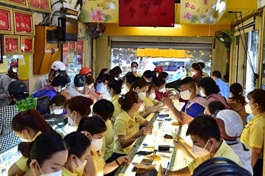Six gold trading enterprises and banks fined
Six gold trading enterprises and banks fined
The State Bank of Việt Nam (SBV) has identified numerous violations in gold trading across several enterprises and banks.

SJC gold pieces being sold at a gold shop in Hà Nội. — VNA/VNS Photo |
On May 30, the State Bank of Việt Nam (SBV) announced inspection results for six major gold trading units in the market: Sài Gòn Jewelry Company (SJC), DOJI Jewelry Group, Phú Nhuận Jewelry Joint Stock Company (PNJ), Bảo Tín Minh Châu, TPBank and Eximbank.
These entities faced administrative fines ranging from VNĐ380 million (US$14,700) to VNĐ2.64 billion for various infractions.
The SBV has also transferred information about SJC, Bảo Tín Minh Châu and PNJ to the Ministry of Public Security for investigation into potential criminal violations related to invoicing, accounting and tax regulations.
For DOJI and TPBank, the SBV has requested that the Ministry's Investigation Police Department on Corruption, Economic and Smuggling Crimes conduct inquiries.
At SJC, there is no basis to conclude that the increase in gold prices from October 2, 2023, to April 15, 2024, was unreasonable. However, the SBV pointed out that gold prices were dependent on the decision of a single individual.
The buying and selling prices of gold at SJC were determined and directly instructed by the company’s General Director at the time, Lê Thúy Hằng.
SJC did not have any internal regulations or procedures outlining specific criteria for setting gold prices. The enterprise also did not clearly delineate the responsibilities of departments in advising on price decisions.
It created risks in determining gold prices in the market, particularly since SJC holds a significant market share.
Regarding DOJI Jewelry Group, the SBV reported that some individuals sold raw gold to the enterprise with quantities deemed unusual given the sellers' occupations and personal backgrounds.
In one verified case, a company used an individual as an intermediary to sell raw gold to a gold trading enterprise.
This may have been done to avoid issuing invoices, evade tax declarations on the gold sold and conceal the origin of the raw gold. This action has led to instability in the domestic gold market in recent times.
DOJI also committed several violations in its e-commerce operations through the Egold application and website. These include gold mobilisation and gold custody services, despite not having the necessary licences from the relevant authorities.
At Bảo Tín Minh Châu, several violations were recorded, including selling gold at prices higher than the listed and breaches related to e-commerce activities.
The company used digital technology to conduct gold trading but failed to disclose critical information on its website (btmc.vn). These include details regarding the delivery and receipt of goods, the procedures for receiving and resolving customer complaints and the dispute resolution mechanisms related to contracts concluded through the e-commerce site.
The company also lacked a policy to ensure the safety and security of users’ personal information collected and used on the website.
The SBV cited PNJ’s several violations similar to those found at other enterprises, such as failure to comply with gold bar trading reporting requirements. There were also indications that PNJ disseminated misleading information about its products to attract customers, engaging in unfair competition.
PNJ violated regulations on taxation, anti-money laundering, accounting practices and the use of invoices and other financial documentation.
As for Eximbank, the SBV identified that bank employees facilitated 'fictitious' gold bar transactions.
Meanwhile, TPBank agreed to keep SJC gold bars for customers but did not seal the gold nor record the serial numbers.
The SBV also raised concerns over certain individuals engaging in frequent gold bar transactions with TPBank multiple times per day or month, with signs of commercial activity. The annual transaction value of some individuals reached trillions of đồng.
SBV acknowledged that inconsistencies remain in the interpretation of current regulations. Decree No.24 does not require the issuance of business licences for individuals to trade in gold bars. However, individuals are permitted to buy and sell gold bars through organisations that have been licensed.
- 10:42 31/05/2025


























